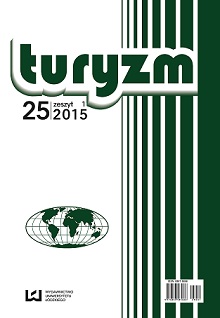Applying ‘mixed methods’ in the study of tourist behaviours in the city – an example of conceptualization and application (discursive article)
DOI:
https://doi.org/10.2478/tour-2014-0020Keywords:
mixed methods, research into tourist behaviours, behavioural experiment, movement monitoring, GPS, focus group interviewAbstract
This article fits into the category of a conceptual-discursive article. Its aim is to discuss the application of ‘mixed methods’ in research concerning tourist behaviours, especially in the city. The article consists of a part presenting a set of methods used to study such behaviours and a part discussing the results concerning the application of a proposed research procedure algorithm. The authors take a behavioural approach and propose using a quasi-experimental method combined with techniques of mobility monitoring (GPS), and the qualitative methods used in sociological research. The article presents a discussion concerning ‘mixed methods’, discusses a proposed algorithm of research procedure and presents conclusions following the joint application of these methods.
Downloads
References
AMEDEO D., GOLLEDGE R.G., STIMSON R.J., 2009, Person – Environment – Behaviour Research: Investigating Activities and Experiences in Spaces and Environments, Guilford Press, New York, London.
Google Scholar
ANDERSON J., 1971, Space-time budgets and activity studies in urban geography and planning, Environment and Planning 3, 4, pp. 353-368.
Google Scholar
BOTTERILL D., PLATENKAMP V., 2012, Key Concepts in Tourism Research, Sage, Los Angeles.
Google Scholar
BUTOWSKI L., 2011, Turystyka jako dyscyplina nauki, Turyzm/ Tourism 21, 1-2, pp. 17-24.
Google Scholar
CRESWELL J.W., 2003, Research Design: Qualitative, Quantitative, and Mixed Methods Approaches, Sage, Thousand Oaks.
Google Scholar
DZIAK J.J., NAHUM-SHANI I., COLLINS L.M., 2012, Multilevel Factorial Experiments for Developing Behavioural Interventions: Power, Sample Size, and Resource Considerations, Psychological Methods, 17, 2, pp. 153-175.
Google Scholar
EVANS J., JONES P., 2011, The walking interview: Methodology, mobility and place, Applied Geography, 31, 2, pp. 849-858.
Google Scholar
GARLING T., GOLLEDGE R.G. (eds.), 1993, Behaviour and Environment: Psychological and Geographical Approaches, Elsevier Science Publishers, Amsterdam.
Google Scholar
GOLLEDGE R.G., KLATZKY R.L., LOOMIS J.M., SPEIGLE J., TIETZ J., 1998, A geographical information system for a GPS based personal guidance system, International Journal of Geographical Information Science, 12, 7, pp. 727-749.
Google Scholar
GREENBERG RAANAN M., SHOVAL N., 2014, Mental Maps Compared to Actual Spatial Behaviour Using GPS Data: A New Method for Investigating Segregation in Cities, Cities, 36, pp. 28-40.
Google Scholar
JIANG H., 2003, Stories Remote Sensing Images Can Tell: Integrating Remote Sensing Analysis With Ethnographic Research in the Study of Cultural Landscapes, Human Ecology, 31, 2, pp. 215-232.
Google Scholar
KITZINGER J., 1995, Introducing focus groups, British Medical Journal, 311, pp. 299-302.
Google Scholar
KRUEGER R.A., CASEY M.A., 2008, Focus Groups: A Practical Guide for Applied Research, Sage, London.
Google Scholar
LEE H.J., JOH C.H., 2010, Tourism Behaviour in Seoul: An Analysis of Tourism Activity Sequence using Multidimensional Sequence Alignments, Tourism Geographies, 12, 4, pp. 487-504.
Google Scholar
LISZEWSKI S., 2008, Miasto jako przedmiot badań geografii turyzmu w Polsce, Turyzm, 18, 1, pp. 27-38.
Google Scholar
LISZEWSKI S., 2010, Nauka czy nauki o turystyce, Turyzm/ Tourism, 20, 2, pp. 37-45.
Google Scholar
LONGHURST R., 2003, Semi structured interviews and focus groups, [in:] N.J. Clifford, G. Valentine (eds.), Key Methods in Geography, Sage, London, pp. 117-132.
Google Scholar
MAIK W., MARCINIAK K., PALICH P. (red.), 2005, Teoria i praktyka w turystyce, Zeszyty Naukowe Wyższej Szkoły Gospodarki w Bydgoszczy, 2.
Google Scholar
MAIK W., PRZYBECKA-MAIK M., 2005, Główne czynniki i płaszczyzny integracyjne w naukach o turystyce, Zeszyty Naukowe Wyższej Szkoły Gospodarki w Bydgoszczy, Turystyka i Rekreacja, 3, pp. 25-32.
Google Scholar
MARAK J., WYRZYKOWSKI J., 2009, Turystyka jako przedmiot interdyscyplinarnych badań naukowych, Zeszyty Naukowe Uniwersytetu Szczecińskiego 567, Ekonomiczne Problemy Turystyki, 12, pp. 165-180.
Google Scholar
MCKENDRICK J.H., 2009, Mixed and Multiple Methods, [in:] R. Kitchin, N. Thrift (eds.), International Encyclopedia of Human Geography, Elsevier, Nowy York, Londyn, pp. 128-133.
Google Scholar
MODSCHING, M., KRAMER, R., TEN HAGEN, K., 2006, Field trial on GPS Accuracy in a medium size city: The influence of built-up, 3rd Workshop on Positioning, Navigation and Communication, pp. 209-218.
Google Scholar
MOLES M., 2008, A Walk in Thirdspace: Place, Methods and Walking, Sociological Research Online, 13, 4; http://www.socresonline.org.uk/13/4/2.html 13.03.2014 r.
Google Scholar
MONTELLO D.R., SUTTON P.C., 2006, Introduction to Scientific Research Methods in Geography, Sage, Thousand Oaks.
Google Scholar
PETTERSSON R., ZILLINGER M., 2011, Time and Space in Event Behaviour: Tracking Visitors by GPS, Tourism Geographies, 13, 1, pp. 1-20.
Google Scholar
PHILIP L.J., 1998, Combining quantitative and qualitative approaches to social research in human geography An impossible mixture?, Environment and Planning A, 30, pp. 261-276.
Google Scholar
PODEMSKI K., ISAŃSKI J., 2008, Niektóre problem metodologiczne badań turystów i instytucji turystycznych, [in:] Z. Młynarczyk, A. Zajadacz A. (eds.), Turystyka i Rekreacja – Studia i Prace, 2, pp. 151-173.
Google Scholar
PRINCE M., BROWN S., HEATHCOTE A., 2012, The Design and Analysis of State-Trace Experiments, Psychological Methods, 17, 1, pp. 78-99.
Google Scholar
QUIROGA C.A., BULLOCK D., 1998, Travel time studies with global positioning and geographic information systems: an integrated methodology, Transportation Research Part C: Emerging Technologies, 6, 1, pp. 101-127.
Google Scholar
ROCHELEAU D., 1995, Maps, numbers, text and context: Mixing methods in feminist political ecology, The Professional Geographer, 47, 4, pp. 458-466.
Google Scholar
RZESZEWSKI M., KOTUS J., 2014, Supporting movement patterns research with qualitative sociological methods – gps tracks and focus group interviews, GISRUK 2014, Presented at the GISRUK 2014, Glasgow.
Google Scholar
SHOVAL N., ISAACSON M., 2007, Tracking tourists in the digital age, Annals of Tourism Research, 34, 1, pp. 141-159.
Google Scholar
SHOVAL N., ISAACSON M., 2010, Tourist mobility and advanced tracking technologies, Routledge, London.
Google Scholar
THORNTON P.R., WILLIAMS A.M., SHAW G., 1997, Revisiting time-space diaries: an exploratory case study of tourist behaviour in Cornwall, England, Environment and Planning A, 29, 10, pp. 1847-1867.
Google Scholar
THYER B.A., 2012, Quasi-Experimental Research Designs, Oxford University Press, Oxford, New York.
Google Scholar
TRIBE J., 2006, The truth about tourism, Annals of Tourism Research, 33, pp. 360-381.
Google Scholar
WYLIE J., 2005, A single day’s walking: narrating self and landscape on the South West Coast Path, Transactions of the Institute of British Geographers, 30, pp. 234-247.
Google Scholar
XIA J., ARROWSMITH C., JACKSON M., CARTWRIGHT W., 2008, The Wayfinding Process Relationships between Decision-Making and Landmark Utility, Tourism Management, 29, 3, pp. 445-457.
Google Scholar
XIA J., ZEEPHONGSEKUL P., PACKER D., 2011, Spatial and temporal modelling of tourist movements using Semi-Markov processes, Tourism Management, 32, 4, pp. 844-851.
Google Scholar
ZITO R., D’ESTE G., TAYLOR M.A.P., 1995, Global positioning systems in the time domain: how useful a tool for intelligent vehicle-highway systems?, Transportation Research Part C: Emerging Technologies, 3, 4, pp. 193-209.
Google Scholar
Downloads
Published
How to Cite
Issue
Section
License

This work is licensed under a Creative Commons Attribution-NonCommercial-NoDerivatives 4.0 International License.










